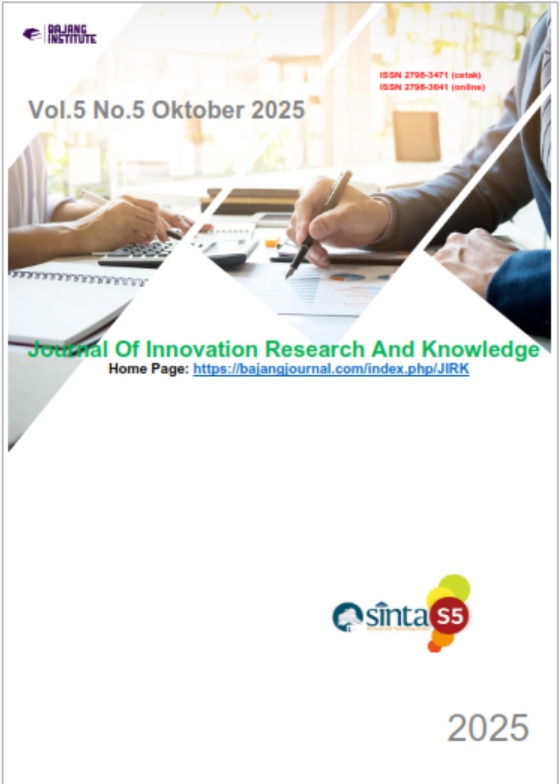EKSPLORASI STREET ART MARKET DALAM MENINGKATKAN PARIWISATA DAN BRANDING DESTINASI
DOI:
https://doi.org/10.53625/jirk.v5i5.11531Keywords:
Street Art Market, Pariwisata, Branding DestinasiAbstract
Eksplorasi Street Art dalam Peningkatan Branding Pariwisata Dan Destinasi. Street art merupakan fenomena seni yang terus berkembang dan mengalami evolusi signifikan di era kontemporer. Street art tidak hanya mencerminkan perubahan dalam seni tetapi juga menjadi sarana penting bagi beragam dialog dan interaksi antara seniman, kota, dan pengunjung. Penelitian ini berupaya menjelaskan bagaimana street art meningkatkan pariwisata lokal dan branding destinasi di Kota Surakarta. Metode penelitian ini menggunakan kualitatif dengan pendekatan naratif, dimana peneliti ingin menjelaskan lebih dalam berdasarkan hasil pengalaman. Pengumpulan data dilakukan peneliti dengan menggunakan observasi, wawancara, dan dokumentasi. Peneliti menganalisis data dengan analisis interaktif. Studi ini menunjukkan bahwa street art berperan penting dalam meningkatkan pariwisata lokal dan membangun branding destinasi. Tingginya minat masyarakat terhadap street art menciptakan peluang ekonomi positif bagi seniman lokal dan usaha kecil menengah (UMKM). Hasil penelitian ini menunjukkan bahwa street art tidak hanya menciptakan pengalaman budaya yang unik bagi wisatawan tetapi juga memberikan dampak positif terhadap pertumbuhan ekonomi dan citra destinasi perkotaan, memperkuat status kota sebagai destinasi wisata yang menarik.
References
Alizadeh, H., Bork-Hüffer, T., Kohlbacher, J., Mohammed-Amin, R. K., & Naimi, K. (2022). The contribution of urban public space to the social interactions and empowerment of women. Https://Doi.Org/10.1080/07352166.2022.2095915. https://doi.org/10.1080/07352166.2022.2095915
Antara. (2023). Solo Street Art Market. Https://Www.Antarafoto.Com/. https://www.antarafoto.com/id/view/1895022/solo-street-art-market
Astuti, D. W., Kussudyarsana, K., Wibowo, D. S., & Prambudi, R. S. A. (2023). Pemetaan Karakteristik Kemlayan melalui Pendekatan Terintegrasi dalam Konteks Pengembangan Kampung Tematik. Sinektika: Jurnal Arsitektur, 20(2), 204–210. https://doi.org/10.23917/SINEKTIKA.V20I2.22724
Baloglu, S., & McCleary, K. W. (1999). A model of destination image formation. Annals of Tourism Research, 26(4), 868–897. https://doi.org/10.1016/S0160-7383(99)00030-4
Barnes, S. J., Mattsson, J., & Sørensen, F. (2014). Destination brand experience and visitor behavior: Testing a scale in the tourism context. Annals of Tourism Research, 48, 121–139. https://doi.org/10.1016/J.ANNALS.2014.06.002
Batista, A., Kovacs, S., & Lesky, C. (2013). Planning Realities of Public Space: At Ground Level with Artistic Practice. Život Umjetnosti : Časopis o Modernoj i Suvremenoj Umjetnosti i Arhitekturi, 92(1), 94–105.
Bruce, A., Beuthin, R., Sheilds, L., Molzahn, A., & Schick-Makaroff, K. (2016). Narrative Research Evolving. Http://Dx.Doi.Org/10.1177/1609406916659292, 15(1). https://doi.org/10.1177/1609406916659292
Calder, B. J., & DuPuis, S. (2010). Packaging and Brand Design. Wiley International Encyclopedia of Marketing. https://doi.org/10.1002/9781444316568.WIEM04024
Chen, Y. C., King, B., & Lee, H. W. (2018). Experiencing the destination brand: Behavioral intentions of arts festival tourists. Journal of Destination Marketing & Management, 10, 61–67. https://doi.org/10.1016/J.JDMM.2018.06.004
Flagestad, A., & Hope, C. A. (2001). “Scandinavian Winter”; Antecedents, concepts and empirical observations underlying a destination umbrella branding model. Tourism Review, 56(1–2), 5–12. https://doi.org/10.1108/EB058351/FULL/XML
Forte, F., & De Paola, P. (2019). How Can Street Art Have Economic Value? Sustainability 2019, Vol. 11, Page 580, 11(3), 580. https://doi.org/10.3390/SU11030580
Franklin, A. (2018). Art tourism: A new field for tourist studies. Https://Doi.Org/10.1177/1468797618815025, 18(4), 399–416. https://doi.org/10.1177/1468797618815025
Gkoumas, A., & D’Orazio, F. (2020). Public-space tactical intervention as urban tourist allure. International Journal of Tourism Cities, 6(4), 711–730. https://doi.org/10.1108/IJTC-05-2019-0066
Mcauliffe, C. (2016). Graffiti or Street Art? Negotiating the Moral Geographies of the Creative City. Http://Dx.Doi.Org/10.1111/j.1467-9906.2012.00610.X, 34(2), 189–206. https://doi.org/10.1111/J.1467-9906.2012.00610.X
Miles, H. ., Huberman, A. ., & Saldana, J. (2014). Qualitative Data Analysis, A. Methods Sourcbook (3rd ed.). Sage Publicatians.
Mura, P., & Slak Valek, N. (2022). Art tourism and urban development in Mussafah, Abu Dhabi – a business owners’ perspective. Https://Doi.Org/10.1080/13683500.2022.2136567, 26(14), 2375–2388. https://doi.org/10.1080/13683500.2022.2136567
Nikoo, Z., Torabi Farsani, N., & Emadi, M. (2022). Trompe l’œil: an approach to promoting art tourism (case study: Shiraz city, Iran). Journal of Tourism Futures, 8(1), 88–98. https://doi.org/10.1108/JTF-09-2019-0090
Pechlaner, H., Raich, F., & Zehrer, A. (2007). The alps: Challenges and potentials of a brand management. Tourism Analysis, 12(5–6), 359–369. https://doi.org/10.3727/108354207783228000
Pereira, R. L. G., Correia, A. L., & Schutz, R. L. A. (2012). Destination Branding: A Critical Overview. Journal of Quality Assurance in Hospitality and Tourism, 13(2), 81–102. https://doi.org/10.1080/1528008X.2012.645198
Pike, S. (2005). Tourism destination branding complexity. Journal of Product and Brand Management, 14(4), 258–259. https://doi.org/10.1108/10610420510609267/FULL/PDF
Qu, H., Kim, L. H., & Im, H. H. (2011). A model of destination branding: Integrating the concepts of the branding and destination image. Tourism Management, 32(3), 465–476. https://doi.org/10.1016/J.TOURMAN.2010.03.014
Qu, M., & Zollet, S. (2023). Neo-endogenous revitalisation: Enhancing community resilience through art tourism and rural entrepreneurship. Journal of Rural Studies, 97, 105–114. https://doi.org/10.1016/J.JRURSTUD.2022.11.016
Raposo, O. R. (2023). Street Art Commodification and (An)aesthetic Policies on the Outskirts of Lisbon. Journal of Contemporary Ethnography, 52(2), 163–191. https://doi.org/10.1177/08912416221079863
Ravichandran, S. S. (2023). Branding Regenerative Tourism for Sustainable Rural Destinations : A Critical Reflection Perspective. Indian Journal of Marketing, 53(6), 60–65. https://doi.org/10.17010/IJOM/2023/V53/I6/172768
Ruiz-Real, J. L., Uribe-Toril, J., & Gázquez-Abad, J. C. (2020). Destination branding: Opportunities and new challenges. Journal of Destination Marketing & Management, 17, 100453. https://doi.org/10.1016/J.JDMM.2020.100453
Santamarina-Campos, V., de-Miguel-Molina, B., de-Miguel-Molina, M., & Segarra-Oña, M. (2017). Digital Integration of the European Street Art: Tourism, Identity and Scientific Opportunities. Springer Proceedings in Business and Economics, 35–47. https://doi.org/10.1007/978-3-319-47732-9_3
Simões, A. V. (2023). Street Art in Aveiro: City Walls as Dialogic Spaces of Collective Memories and Identity. Societies, 13(3). https://doi.org/10.3390/SOC13030054
Tavakoli, R., & Wijesinghe, S. N. R. (2020). Digital Art and Virtual Tourism Mobility: A Critical Discussion. Perspectives on Asian Tourism, Part F187, 231–247. https://doi.org/10.1007/978-981-15-4335-7_11
UNWTO. (2007). A Practical Guide to Tourism Destination Management. World Tourism Organization. https://doi.org/10.18111/9789284412433
Visconti, L. M., Sherry, J. F., Borghini, S., & Anderson, L. (2010). Street art, sweet art? Reclaiming the “Public” in public place. Journal of Consumer Research, 37(3), 511–529. https://doi.org/10.1086/652731/2/M_37-3-511-FG1_ONLINE.JPEG
Wagner, O., & Peters, M. (2009). Can association methods reveal the effects of internal branding on tourism destination stakeholders? Journal of Place Management and Development, 2(1), 52–69. https://doi.org/10.1108/17538330910942807
Young, A. (2012). Criminal images: The affective judgment of graffiti and street art. Http://Dx.Doi.Org/10.1177/1741659012443232, 8(3), 297–314. https://doi.org/10.1177/1741659012443232
Zhu, X., Li, X., Gong, J., & Xu, J. (2022). Technology empowerment: A path to poverty alleviation for Chinese women from the perspective of development communication. https://doi.org/10.1016/j.telpol.2022.102328













